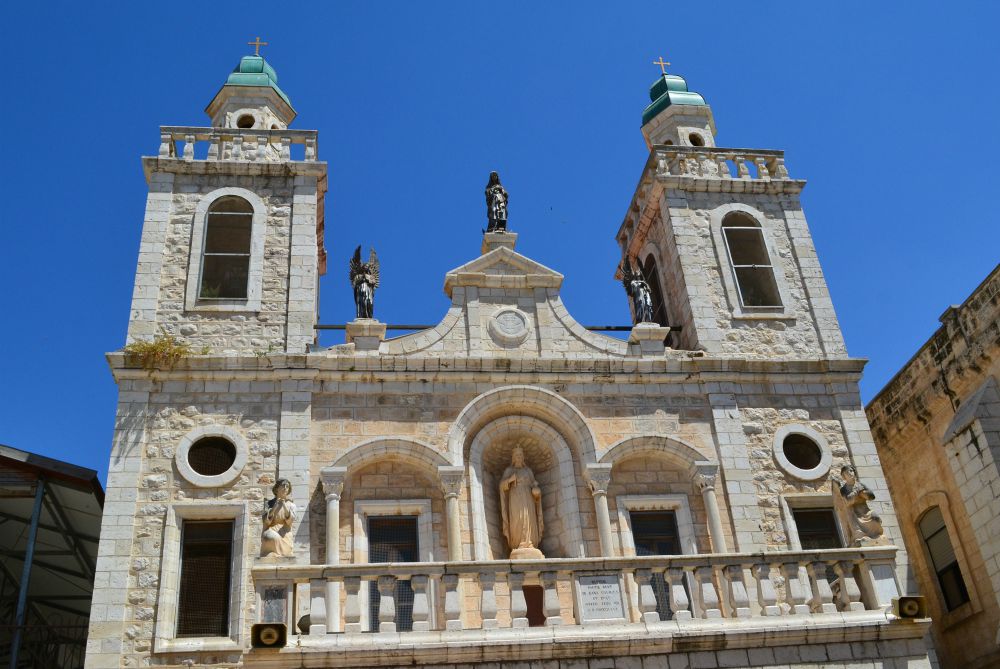
Wedding Church at Cana, pictured May 2017, was built circa 1881 in Kafr Kanna, Israel, and named in commemoration of the wedding in the Gospel of John. (Wikimedia Commons/Larry Koester)
"There's nothing worth doing that isn't worth overdoing." Thus spoke one of my delightfully irreverent college friends. Impudent as that sounds, it echoes one commentary about the first of Jesus' signs recorded in John's Gospel. Scripture scholar Silvano Fausti says that this story "tries to show us in one fell swoop how scandalously distinct God is from what we would imagine."
Really, what wedding celebration needs 600 liters of wine? But that is the story John tells us. The theological message seems to be that God is willing to go to extremes — and not necessarily the kind people ordinarily preach about.
While we have probably heard that the wedding at Cana showed Jesus' blessing of marriage, the story falls miserably short on marital details. The only member of the wedding party who even gets mentioned is the anonymous groom, and his only role is to hear that the new wine is better than the old.
The principal characters in the story are two of the wedding guests: Jesus and his mother. The secondary characters are servants. The family, disciples, bridesmaids, etc., are just extras. The entire plot flows around the wine. John the Baptist and his ascetic friends would be shocked!
Obviously, this is not a story about marriage and family. Nevertheless, it is a story about a marriage feast. In John's Gospel, it is the first act in the Messiah's mission to bring the union of God and humanity to fulfillment.
John the Evangelist called this the first of Jesus' "signs," events we often think of as miracles. But Jesus' signs were far more than one-time miracles. They were portents of things to come. Jesus' signs announced that something radically new was happening. We could consider the sign of the wedding wine as a living parable, a performance that explained Jesus' first declaration of his mission when he said: "This is the time of fulfillment. The kingdom of God is at hand!" (Mark 1:15).
John pays almost no attention to the actual bride and groom because this story is about the marriage of God and the people. The wedding without wine is the situation in which the old traditions, like the empty ceremonial jars, have lost their power.
This wedding is a lifeless liturgy. The principal players are nameless, the disciples are mere bystanders. People go through the motions, but there is no passion. It is as if they think this is what they are supposed to do, but they have no idea why they still believe in it. Anybody could do what they are doing and it would make no difference.
Then the mother of Jesus enters the scene. As the representative of Israel's hope, as Israel's potential to give life, she protests. A wedding without wine is a liturgy with no passion — a sacrilege.
The ever-enigmatic Jesus responds that his hour has not yet come. But Mother Israel, trusting that prayer will never go unheard, tells the servants, "Do whatever he tells you." Like Moses who bid his people to choose life, she instructed God's servants to obey Jesus' word.
This brings the scene to its climax. Jesus asks the servants to do something utterly simple. He instructs them to fill their empty ceremonial jars. He tells them to fulfill the religious practices they had allowed to fall into neglect. Their obedience provided him with the raw material for working his sign. When they filled the jars to the brim, they demonstrated wholeheartedness, and God had something new to work with.

(Mark Bartholomew)
In a story that will be echoed in the account of the loaves and fishes, Jesus took the little they could provide and transformed it into an overabundance. John tells us that this event marked the first revelation of Jesus' glory and that the disciples began to believe in him.
According to the Gospel of John, this was Jesus' primordial sign, the event that foreshadowed everything that was to come. Jesus said that his time had not yet come, but Mary believed that his very presence meant that the time was ripe.
We may be living in the same time zone as the guests at Cana. Too many of us have become accustomed to dryness. Like impassive wedding guests, we go through the motions of the ceremonies without great expectations. The real scandal highlighted in this story is not wine, but passivity.
Today, Mary asks us if we want things to be different, if we are willing to risk the experience of God's lavish love. If so, it is time to turn to Jesus and do whatever he tells us. It is time for great expectations.
[Mary M. McGlone is a Sister of St. Joseph currently writing the history of the Sisters of St. Joseph in the U.S.]
Editor's note: This Sunday Scripture commentary was originally published in the January 2019 issue of Celebration, a comprehensive pastoral resource. To read the full version of the commentary, click here. Sign up to receive weekly Scripture for Life emails.
Advertisement







